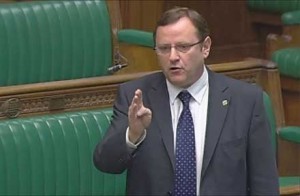 Labour MP Phil Wilson is calling for a professional register of private landlords. While proposing his bill he described the vast majority of private landlords as ‘amateurs without the skills and wherewithal to deal with being a private landlord’.
Labour MP Phil Wilson is calling for a professional register of private landlords. While proposing his bill he described the vast majority of private landlords as ‘amateurs without the skills and wherewithal to deal with being a private landlord’.
The purpose of the register would be to enable local authorities to get a handle on the local private sector so that they can work with landlords.
Yesterday (14th June) while proposing his Ten Minute Rule Bill ‘Private Landlords (Register and Duties)’ he said:
“With proposed changes to homelessness legislation, cuts to housing and high house prices and deposits, private renting will be under increasing pressure, especially at the lower end of the market among the most vulnerable groups.The private rented sector is rife with problems. Some 36% of Shelter advice queries come from private renters, more than double the proportion in the population at large. Satisfaction is lower, and accommodation is more likely to be of a poor standard. According to Julie Rugg’s investigation of the private rented sector in 2008, 50% of privately rented properties failed to meet the decent homes standards.
The expansion of buy-to-let lending over the past decade saw a much wider range of individuals become landlords, many of them with little or no experience, knowledge or understanding of their responsibilities and the complex legal framework of renting.
In fact, the buy-to-let sector includes more than 650,000 homes that could have been in the owner-occupier market, and the fact that they are not has helped to force up house prices. Where there are high concentrations of private lets, some have caused a blight on the local community, especially in low-demand areas.
The basic problem is not private landlords. Some are a problem and some are very good landlords, but the vast majority are amateurs without the skills and wherewithal to deal with being a private landlord. The buy-to-let market has led to a huge increase in such landlords. The market has grown because of people saw it as an opportunity to make capital gain, for example, from increased profits from the value of properties.
The purpose of the register would be distinct from licensing. It would be mandatory and its purpose would be to enable local authorities to get a handle on the local private sector so that they can work with landlords. The register could be run by local authorities or housing associations, or it could be outsourced to a third-party. A fee could be charged for administrative costs. Sanctions for failing to register could be preventing landlords from serving section 21 notices, rent payment orders or fines.
The register could help local authorities to determine how many private landlords there are in a given area. If the number reaches a certain level, I believe that landlords should pay a community levy, especially in those areas where they dominate the housing stock.
If people take out of the community, they should put back into it. If, for example, 25% of homes in a given area are private lets, or if one landlord owns several properties in an area, a community levy should be payable into a fund to put towards the upkeep of the area. Local people, in the spirit of localism, could decide how the fund is spent, whether to help with policing, environmental issues or whatever. Social landlords already do that, so why not private landlords?
Again, the levy could be administered by a local authority, housing association or another arm’s length organisation. The more efficiently the community levy fund is administered, the more money will be available for investing in community programmes.”
Any comments?
Read full speech here.
Source: TheyWorkForYou




